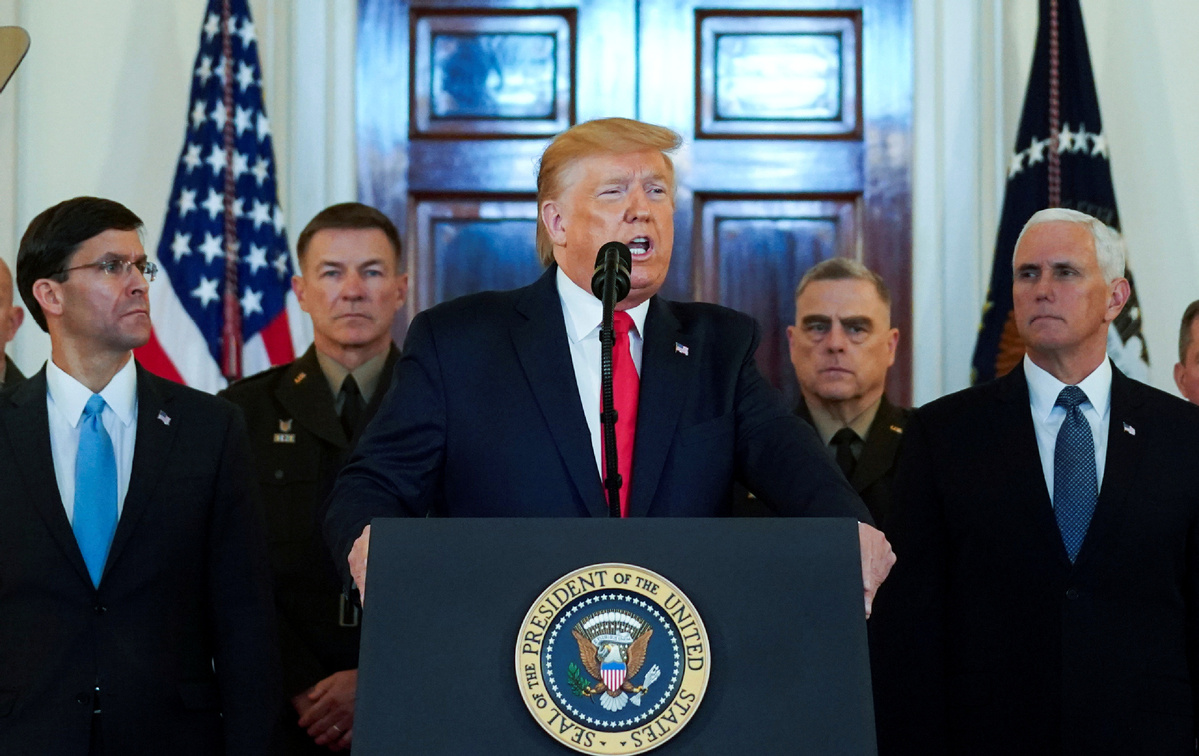US weighs up Iran squeeze options
China Daily Global | Updated: 2020-04-29 10:22

Push for extended arms embargo seen as tied to bid to kill off nuclear accord
WASHINGTON - US President Donald Trump's administration has persistently trashed a nuclear deal with Iran. But as it seeks to extend an arms embargo, it is making the case that it still has a seat at the table.
The push has drawn skepticism from Western allies and has led critics to question if the ultimate aim is to kill the deal entirely, potentially in the final stretch of Trump's reelection campaign.
"You cannot cherry-pick a resolution saying you implement only parts of it but you won't do it for the rest," a Western diplomat said on condition of anonymity.
US Secretary of State Mike Pompeo has called on United Nations members to renew the ban on all conventional arms exports to Iran. It is due to expire in October.
He renewed his push last week after Iran launched the country's first military satellite into orbit.
The launch should lead more countries to "understand what Trump has understood since he first came into office, that the Iran deal was a crazy, bad deal", Pompeo said.
Washington has shared its strategy, confirmed by a US official speaking on condition of anonymity, with the United Kingdom, France and Germany, which are council members and parties to the 2015 deal between Iran and world powers that prevents Teheran from developing nuclear weapons in exchange for sanctions relief.
A US-drafted resolution to extend the embargo beyond October has been given to the UK, France and Germany, the US official confirmed, but UN diplomats said it has not been shared with the remaining 11 council members, including Russia and China.
"It will be dead on arrival," predicted a Security Council diplomat, speaking on condition of anonymity.
Former US secretary of state John Kerry has said the five-year embargo was a compromise with Russia, which opposed any limits.
Wielding veto power, Russia is almost certain to oppose a new embargo, with it potentially in line for billions of dollars in arms contracts, Agence France-Presse said.
But there is one way to skirt a veto-if a party to the deal asserts that Iran is in significant violation of it; this would trigger a return of international sanctions.
In a legal opinion issued last year to please hawkish Republicans, the US State Department argued that Washington could do so as it was listed as a "participant state" in the 2015 resolution.
"It's very difficult to present yourself as a compliance watcher of a resolution you decided to pull out of," said a European diplomat, speaking on condition of anonymity. "Either you're in or either you're out."
The US, of course, has shattered its own promises under the deal, formally known as the Joint Comprehensive Plan of Action, or JCPOA, which was meant to offer economic relief to Iran and is still backed by European powers.
Trump, who is close to Iran's regional rivals Saudi Arabia and Israel, has imposed sweeping unilateral sanctions that include trying to block all of Iran's oil exports as he seeks to reduce Teheran's regional activities.
'Stop dreaming'
Iranian Foreign Minister Mohammad Javad Zarif, responding on Twitter to a New York Times article on the strategy, said that Pompeo had hoped in exiting the deal to "bring Iran to its knees".
"Given that policy's abject failure, he now wants to be JCPOA participant. Stop dreaming: Iranian Nation always decides its destiny," Zarif wrote.
Kelsey Davenport, director for nonproliferation policy at the Arms Control Association, a think tank, said: "If Pompeo goes through with this plan, snapping back sanctions on Iran collapses the JCPOA."
Even more significant, the move could lead Iran to make good on threats to exit the nuclear Non-Proliferation Treaty, she said.
"This is just another step that would undermine US credibility, make future negotiations with Iran more difficult and increase the risk of a nuclear crisis in the region," said Davenport, adding that there were other avenues to address arms exports.
Agencies Via Xinhua
























